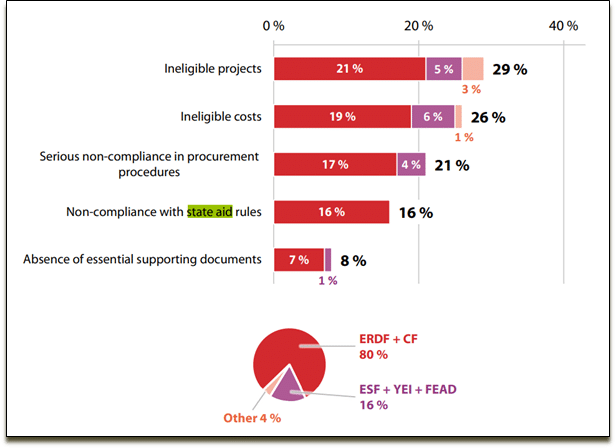
The annual report on the 2023 EU budget by the European Court of Auditors finds that in the field of State aid national authorities wrongly supported ineligible costs.
Errors in public procurement and State aid were the largest source of irregularities.
Main findings concerning public procurement and State aid
“The risk of error is high for expenditure subject to complex rules. […] they must often follow complex rules regarding what can be claimed (eligibility) and how costs can be properly incurred (public procurement or State aid rules.” [p.30]
“The main types of error we quantified were ineligible projects and costs, non-compliance with public procurement or State aid rules, and absence of essential documents.” [p.33]
“Errors relating to infringements of public procurement rules […] and of State aid rules […] contributed 31 % (2022: 20 %) to the estimated level of error for high-risk expenditure in 2023.” [p.34]
Examples:
- Large private companies received grants for R&D projects under the General Block Exemption Regulation (GBER). The projects contravened Article 25 of the GBER by wrongly declaring full equipment costs. According to this article, where equipment is used beyond project completion, only the depreciation costs of the investment during the project lifespan are eligible. A significant proportion – ranging between 69 % and 94 % of the aid granted for these projects – was non-compliant with State aid rules and therefore ineligible for funding. [p.246]
- Wrong calculation of overhead costs. [p.449]
Need for attention to the closure of programmes
“Programme authorities will still have to address the final assessment of the eligibility of costs declared for some operations, particularly those involving investments made by financial instruments, the clearing of State aid advances, the final assessment of revenue-generating operations, and the handling of non-functioning operations.” [p.262]
Checks that need to be carried out [p.362]:
- Eligibility of project
- Eligibility of beneficiary & final recipient
- Eligibility of costs incurred
- Compliance with public procurement for all transactions
- Compliance with State aid rules for all transactions
Contribution to overall errors

Source: ECA



